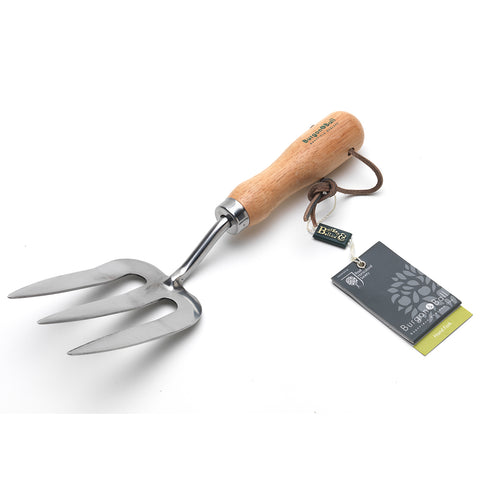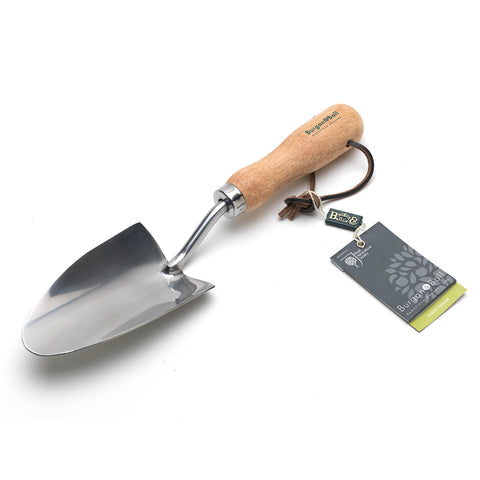 We’ve collaborated for some years now with the Royal Horticultural Society (RHS) on our extensive ranges of RHS-endorsed tools and gorgeous licensed gifts. We look forward every year to going to the RHS Chelsea Flower Show, and to spending a week on our stand on the show’s Main Avenue, in the thick of the media hubbub surrounding the latest garden design ideas and what colours are ‘in’ for planting schemes this year.
We’ve collaborated for some years now with the Royal Horticultural Society (RHS) on our extensive ranges of RHS-endorsed tools and gorgeous licensed gifts. We look forward every year to going to the RHS Chelsea Flower Show, and to spending a week on our stand on the show’s Main Avenue, in the thick of the media hubbub surrounding the latest garden design ideas and what colours are ‘in’ for planting schemes this year.
We’re used to thinking of our tools cultivating the rich soil (and let’s face it, sometimes the clay, the chalk and the flint!) of our mostly-temperate British climate. But when we heard about a community in Africa in need of hand tools for a gardening project under altogether different circumstances, we wanted to hear more.
Our Global School

Professional gardener Emma Arthur got in touch to introduce us to Our Global School (OGS), a London-based charity which seeks to develop links between state schools in UK and Africa, advancing education for all. Emma’s son has attended two of the schools linked to the charity (Salusbury Primary School and Queens Park Community School, both in Brent), and the schools had taken part in several trips to their twin primary school and community in Mbollet Ba, Niumi, The Gambia.
The students on both sides clearly get immeasurable benefit from the contact with their peers half a world away, making friendships which endure long after the visit ends. But the close relationship between the schools also has impact on the wider community of Mbollet Ba, and Emma told us about one aspect of the visits which is especially close to her heart: the village’s community garden.

A community garden
The garden is around two to three acres, depending on how much is being cultivated at any one time. Traditionally run by women, the plot successfully produces many vegetables including potatoes, onion, cassava, spinach, chilli, peppers, aubergines, bitter tomato and beans.
Due to the sub-tropical climate of the Niumi region, the women work for a couple of hours at the beginning and end of each day. The children of the village help ‘top water’ the ground in the evenings from ground wells around the site. The dry season runs from October to June and the rainy season runs from June to October, so there are seasonal challenges to face, although essentially the soil type isn’t too bad; dry sandy soil on top, as might be expected, with clay 20cm down. The women’s produce is sold at midday at the local market, an event also set up by OGS.
The garden originally had up to 100 women working the land, but on Emma’s first visit to Mbollet Ba, she learned that numbers had dropped due to many of the water wells not working. This was addressed as a priority on the group’s return to the UK, and OGS managed to arrange for repairs to be made to the wells within a couple of months.
Getting creative with composting
During her visit Emma also heard that the women also struggle to increase the yield from the garden. Happily here Emma was able to contribute her horticultural knowledge, and she worked with the community to introduce a new method of composting, the Bangalore Pit Method, to help improve the garden’s soil and as a result, the crop yield.
 Describing how the community went about creating the new compost pits, Emma says: “First we identified a suitable site with a bit of shade, close to a well. Two pits were dug out by Malik and Ablei, two sons of the women gardeners. The pits were then sealed with a mix of water and manure. Next, we used a stick painted with colours to signify each different material, and placed it in the middle of each pit to show the correct level for each layer of material. After that, it was straightforward; each pit was layered up with different materials sourced locally by the women and their children.”
Describing how the community went about creating the new compost pits, Emma says: “First we identified a suitable site with a bit of shade, close to a well. Two pits were dug out by Malik and Ablei, two sons of the women gardeners. The pits were then sealed with a mix of water and manure. Next, we used a stick painted with colours to signify each different material, and placed it in the middle of each pit to show the correct level for each layer of material. After that, it was straightforward; each pit was layered up with different materials sourced locally by the women and their children.”
 The pits are layered like this:
The pits are layered like this:
- Yellow - base layer of dry materials and water sprinkled on top
- Green - second layer of green materials with a sprinkling of human urine to act as accelerator
- Red - third layer of mix of chicken and goat manure with water sprinkled on top
- Black - fourth layer of top soil with water sprinkled on top
Additional sets of layers are then added on top, starting with the ‘yellow’ base layer of dry materials. Finally, when the pit is full, it is finishing with a covering of rice sacks and a stone at each corner to keep everything in place and to retain moisture. Every few days the pit is checked for the correct level of wetness and heat tested.
A turn for the better
Emma continues: “We dug two pits in order to run a controlled experiment. One pit was turned regularly, while the other was left alone. It was the turned compost pit which was the success in the end, producing plenty of high-quality compost ready to be added to the garden to improve the soil.
“Helping the community get started with this new compost with the help of the women and their children was a fantastic experience. Since the switch, the compost has proved a total success and the women are seeing a significant increase in crop yield, which in turn will increase their income. It’s also meant that since the wells have been fixed and news of the compost has spread, more women are now returning to work in the community garden.”
Tried and tested tools
 And that’s where we came in. With all hands to the pump, so to speak, more tools were urgently needed. In terms of tools, originally the women gardeners just used a mattock and a machete, and when Emma’s group visited they took some donated hand forks and larger forks to dig out the compost pit.
And that’s where we came in. With all hands to the pump, so to speak, more tools were urgently needed. In terms of tools, originally the women gardeners just used a mattock and a machete, and when Emma’s group visited they took some donated hand forks and larger forks to dig out the compost pit.
For ongoing growing, however, the women needed hand trowels and forks for cultivation, planting, and weeding of their crops. We were delighted to provide some of our RHS-endorsed hand forks and trowels to the women, and as they carry a lifetime guarantee we hope these tools will prove to be useful in the community garden for many years to come.
It’s a world away from most of the gardens where our tools are used and loved, but now our tools are improving community life and helping feed families in a village on another continent - thanks to the women gardeners of Mbollet Ba.
o0o
To find our more about the work of Our Global School, visit www.ourglobalschool.org.


